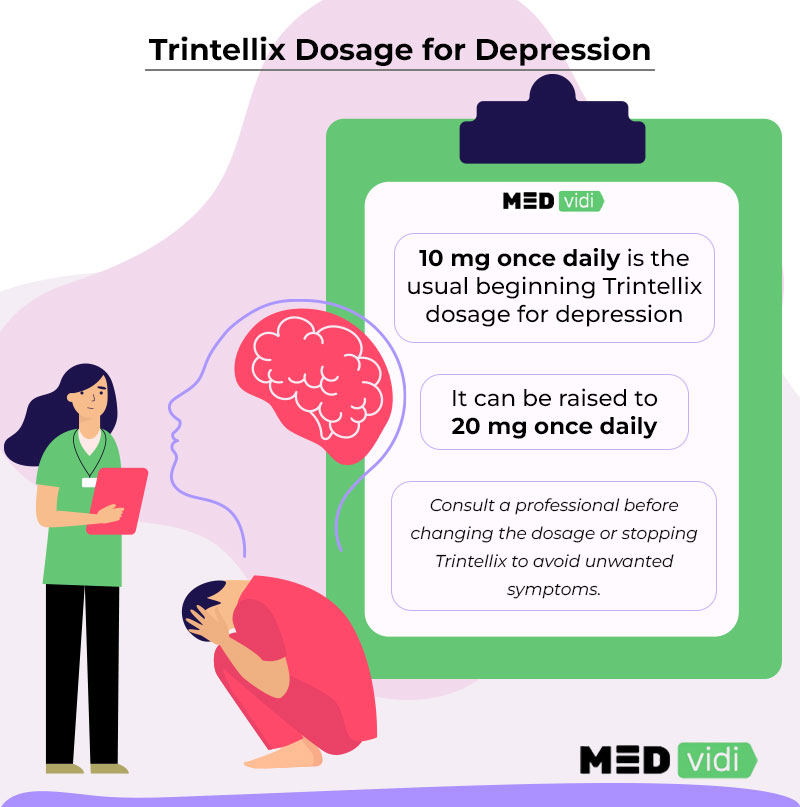The drug vortioxetine is used to treat the major depressive disorder (MDD) and is marketed under the brand names Trintellix and
The Food and Drug Administration (
MDD is treatable. Get online mental health assessment from an expert if depression is affecting your life.
Is Trintellix Good for Major Depression?
Trintellix is among the most effective medications for depression treatment in adults. According to clinical
Furthermore, a third of those who took it reported total or almost complete symptom improvement. Children are not permitted to use Trintellix: it comes with a black-box warning regarding using this medication in depressed children and teenagers as it can increase suicide risk in this age group.
In addition, Trintellix for bipolar depression isn’t an option because it is not a mood stabilizer, and it can cause activation of manic episodes in patients. Therefore, patients should be screened for bipolar disorder before using Trintellex.
Other Trintellix Uses
How Does Trintellix Work?
When some brain chemicals are out of balance, major depressive disorder (MDD) may develop. These chemicals, known as neurotransmitters, function at particular receptors to convey messages from one brain cell to another.
Trintellix is assumed to function, though its exact mechanism of action is yet unknown, by inhibiting the reuptake of a neurotransmitter in the brain called serotonin. Some of the receptors for this brain chemical are also affected by it. It works as an agonist at 5-HT1A receptors, a partial agonist at 5-HT1B receptors, and blocks 5-HT3, 5-HT1D, and 5-HT7 receptors making its functioning challenging to categorize.
Trintellix Dosage
The exact dosage of Trintellix is prescribed by the doctor depending on the nature and severity of the patient’s ailment, any coexisting illnesses, and any other medications they may be taking. The usual beginning Trintellix dosage for depression is 10 milligrams (mg) once daily. Then, this dosage can be raised to 20 mg once daily. Take the missed dose right away if you miss it, but skip it if the next dose is soon due.
Trintellix Side Effects
Despite the fact that Trintellix is an effective medication, its potential adverse effects mean that not everyone should use it. The most frequent side effects of Trintellix include:
- Nausea
- Diarrhea
- Dizziness
- Sleep problems
- Abnormal dreams
- Itchy skin
- Flatulence (gas)
- Constipation
Trintellix doesn’t seem to have a significant impact on weight. However, this medication shouldn’t be abruptly stopped because it affects serotonin in the brain. Although it is not addictive, withdrawal symptoms should be avoided by gradually lowering the dose over weeks.

FAQs About Trintellix
1. What medications are contraindicated with Trintellix?
This medication may interact negatively (and even fatally) with MAO inhibitors. Therefore, while using this medication, avoid using any MAO inhibitors.
2. Is Trintellix suitable for anxiety disorders?
Off-label use of Trintellix for the treatment of anxiety disorders occurs occasionally. However, the full effects of treating anxiety with Trintellix may not manifest for up to 4 weeks. Verify the dangers and advantages of this anxiety medication with your doctor.
3. Is Trintellix safe for major depressive disorder treatment?
Trintellix is recommended as an effective MDD treatment, even though it may lead to a few side effects. Serious adverse reactions to this medication include serotonin syndrome.
4. Is alcohol safe to consume when taking Trintellix?
Medical authorities strongly advise against using Trintellix and consuming alcohol simultaneously. Both impact the central nervous system, which results in sedation, drowsiness, and impairment.
5. Is Trintellix an addictive substance?
Trintellix is not a prohibited/controlled substance. Controlled substances have a legal medical use, but they can also be abused or lead to physical or psychological dependence.
Final Words
The medication Trintellix is branded. It includes the active ingredient vortioxetine. There isn’t a generic version of Trintellix available currently, however it is awaiting final FDA approval.
Even though this medicine is a safe alternative for treating MDD, remember that every person’s body reacts to medications differently. Based on the experiences of others, you cannot accurately anticipate how your body will respond to treatment. Contact MEDvidi doctors to get an individually developed treatment plan based on your symptoms, diagnosis, and health history.












